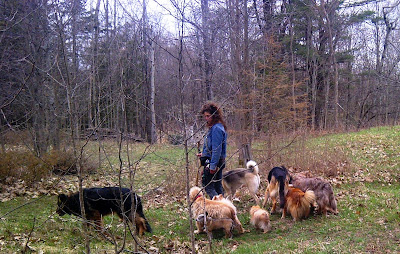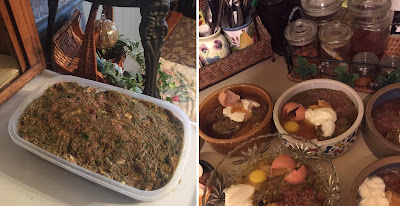HOW TO STOP YOUR DOGS FROM FIGHTING WITH EACH OTHER
 |
| On a Trail Walk with Part of My Own Dog Pack |
To stop your dogs from fighting many elements need to be addressed…
Dog fights between dogs living in the same family happen for various
reasons. The dogs may have been living together for a while when
suddenly one day a fight breaks out. The dog’s people may be caught
totally off-guard and have no idea what sparked the fight. Or you may
have recently adopted a new dog as a companion for your existing dog.
What ever the case, sometimes fights do occur.
It is very important to understand how to intercede and resolve such
conflict early on, as failure to do so can result in development of
repeated stressful behavior, and can quickly escalate to psychological
and/or physical harm…to the dogs and yourself.
Usually, with proper leadership the dogs can learn to
co-exist in peace and harmony. As leader to your dogs, it is your job
to coach and mentor your dogs so that they learn how to get along in a
socially acceptable manner with each other.
If you have no prior experience with this sort of behavior and
suddenly find yourself in the midst of a dog fight it can be a very
stressful experience. When we add our stress to the situation – fights
can become even more intense. Stress creates stress.
FIRST LET ME SHOW YOU HOW ONE DOG FIGHT CAN TURN INTO A PATTERN
OF REPEATED BEHAVIOR…this will help you to understand what you should
not do!
The first time the dogs engage in bickering you are caught
off-guard. You may find yourself shocked, upset and anxious. You may
have split the dogs apart and even put them in separate rooms/spaces.
Caught off-guard, and upset you are in an excited-reactive state.
The dogs were in an excited reactive state. As the dogs look to you for
direction your unintended reaction (fear, anxiousness, anger) reinforced
the dogs state. It tells them my human feels the same way I do so I am
justified in feeling that I should be excited, aggressive reactive. You
led by example – the wrong example. Not your fault – it is natural for
people to do react in this way. But, it is important, moving in to the
future to learn to be self-aware and self-disciplined in order to have
the ability to shut down the situation as opposed to feeding the
situation.
If the dogs were separated by being placed in separate rooms while
they were still in fight mode – they will likely engage in another fight
in the future. Why, because they left the situation still in fight mode
– this has taught them that fight mode is normal and acceptable…you
have not presented them with an alternate method of coping with the
situation.
If instead the dogs are coached to calm down in each the presence
of each other and then allowed to remain together they leave the fight
mode understanding that good social behavior is expected and is the
norm. They have been presented with an alternate method of coping.
At this point the dogs have acquired psychological trauma to one
degree or another and so have you. Dogs are extremely sensitive they
read our body language and are one of the few animals that look at the
left side of our face to read us. Dogs are also one of the few animals
that have a very similar musculature facial structure to
humans. When you anticipate a fight, when you are nervous or
uncomfortable the split second that thought is in your mind your dogs
know, because dogs are such acute, sensitive and aware communicators –
much more so than the untrained human.
In addition, if your dog happens to have Heightened Sensitivity
(HS), your dog will excel at reading your thoughts and your real
emotional state even more quickly and adeptly than a dog that is not an
HS dog.While HS is an asset when understood, it can lead to more stress and anxiety if proper understanding and direction are not available to the dog(s).
I am going to provide you with a series of links to additional articles a little further below. Read the articles to understand more about how your emotional state effects your dog’s behavior. These concepts are pivotal in understanding how you, the human create unwanted behavior in your dog and conversely how you can learn to create good behavior.
The basis for change must start with you. If you want your dogs to have self control and self discipline you have to start by having self control and self discipline yourself. If you do not apply yourself with 100% dedicated, focused effort and if you are not 100% honest with yourself you will not be successful in achieving a positive outcome. If you cannot change your habits, your dog will have no choice but to continue to behave as he/she is currently doing. Change will not be instantaneous – you have to invest time and honest effort.
If you skimp on reading these articles , if you do not take the time to calmly sit-back and absorb what is being said in the articles, then analyze where you have gaps in your current skill set and start working on improving your understanding and skills.
- Dogs are excellent communicators – much better than an untrained present-day human;
- And for the most part dogs do exactly as their human tells them to do;
- The problem is that most people are not aware or disciplined communicators, and as a result do not understand what they are truly communicating;
- The implication of this is that it is the human who must be trained;
- The dog simply needs to be effectively communicated to;
- Self-awareness and self-control, self-discipline must come from the human first and only then can such control be expected of the dog;
- Too many people blame their dog, when in-fact it is the human that has created the seed of the behavior, then enables and maintains the overall environment (physical, mental) that perpetuates the situation;
- Want your dog to be better behaved? You have to learn to be better behaved first – this is an example of the importance of following true and pure logic – dogs love logic much and hypocrisy not at all;
- Dogs have more patience than most present-day humans;
- Patience is not just waiting polity for something you want;
- Patience is also having the great will, determination and persistence to adhere to something you want, need or think you require, think you need.
- It is not your dog that is bad;
- It is that you misunderstand and misdirect your dog, and;
- Then blame your dog for your lack of understanding;
- Leaving your dog no choice but to continue on with its current behavior.
Treats do not correct embedded, intense behavior nor does forceful dominance – employing intelligence which matches a dog’s intelligence corrects behavior. Dogs are much more intelligent than most people realize and until one understands that concept you will struggle to correct unwanted behavior. Read the following articles to get started on the real path to change...
Hyper
Active Dog, Anxious Dog – Heightened Sensitivity
My highly sensitive very dear, sweet Boxer x Pit Bull boy Robbie - who
wasn’t so sweet when he arrived in my pack, he was a badly misunderstood dog
and an abused dog… All dogs are intelligent, sensitive beings, but some dogs
have an even more acute sensitivity and intelligence – these dogs are what I
call ‘Heightened Sensitivity’ Dogs.Continue reading here.
Stress,
Anxiety, Aggression in Dogs – Signs, Symptoms, Treatment
Typical Causes of
Stress, Anxiety, Depression, Aggression in Dogs; Typical Signs of Stress
in Dogs; Long-Term Stress is a Health Threatening Condition The Use of
Conventional Chemical-Based Drugs to Control Stress Other Products that Claim to
Solve Stress and Anxiety Diet Can Create and/or Exacerbate Stress or Help.Debunking The Alpha Dog Myth
Let’s Talk About the Term ‘Alpha’ In reference to wolves, L. David Mech, PhD first coined the term ‘Alpha’, while studying packs of unrelated wolves. He has since done his utmost to convince publishers to stop printing his earlier works were he first defined the term Alpha. Alpha was a term developed to describe a dominate individual at the top.
Continue reading here.
Earn Your Dog’s Respect
Most dogs, will instinctively know what they are being asked to do if they are communicated with & shown in the right way at the right time and provided with the right tools to navigate safely and confidently through situations. If the dog’s guardian has not learned how to read their own dog, is not aware of their own emotions.
Continue reading here.
Don’t Argue With Your Dog
Tugging and pulling, yelling, frustration, anger – it’s all part of engaging in an argument. If you are trying to provide direction to your dog – who is excited.
Continue reading here.
Dogs are Opportunistic – Learn to Work With It
For Sarah, my German Shepherd x Siberian Husky, being an opportunist was key to survival in her first year of life which she spent primarily as a stray. Her wiliness and great intelligence ensured that she survived
Continue reading here.
Don’t Argue With Your Dog
Tugging and pulling, yelling, frustration, anger – it’s all part of engaging in an argument. If you are trying to provide direction to your dog – who is excited.
Continue reading here.
Dogs are Opportunistic – Learn to Work With It
For Sarah, my German Shepherd x Siberian Husky, being an opportunist was key to survival in her first year of life which she spent primarily as a stray. Her wiliness and great intelligence ensured that she survived
Continue reading here.
We humans bring dogs into our lives for so many reasons…for companionship,
because we have a need and the means to help animals whose lives have been
compromised by humanity, for our children, to help on a farm, for rescue and
disaster recovery, tactical operations, for therapy…the reasons are numerous. But what about the dogs themselves?
Continue reading here.
SO WHAT IS THE RIGHT WAY TO INTERCEDE?
#1 By taking full responsibility for the situation:
- Do NOT blame the dog(s);
- Change must start with the human’s acceptance that the human has a
huge role in the development of behavior in their dogs – good and bad;
- This is the first step in enabling change – and it is a hefty responsibility as you must first look at your own weaknesses – help for that further below;
- Many people choose instead to ignore this truth as to accept it means you must be selfless;
- Dogs excel at being selfless, it is an attribute of the species;
- Humans more quickly embrace selfishness – we have to work at being selfless, and that is a trait of our species;
- Most humans have to work hard at learning to have self-control;
- If you are not quite there yet you may be inadvertently creating the same condition in your dog while blaming him/her for the situation;
- Change must start with the human’s acceptance that the human has a
huge role in the development of behavior in their dogs – good and bad;
- If you have or when you do take the time to read the articles listed just above you should now, or will understand this important truth;
- If what I have just written in these bullets has irritated you, made you feel indignant or even angry – then the trigger for your dog’s unhealthy behavior is now obvious.
If all you are going to do is use physical force to attempt to
intercede and stop fights you will fail to change your dogs’ behavior
for the better. You do not have to be a physically large person
to achieve success (teaching your dog’s not to fight). I am only 5′-4″
and about 110 pounds. I work with dogs that are much larger than I am.
What you have to do is train yourself first…psychological control of
yourself is a powerful asset.
Many people tell me that they put their dog on it’s side and he/she still
wants to fight. Well no kidding – you skipped 99% of what you need to
do and simply tried to use physical force to roll your dog. You did not
coach and mentor your dog and you did not change your own bad habits –
you simply employed physical force – you became aggressive and overly
physical – you matched your dog’s state. I very rarely ever roll a dog
on its side and I work with a lot of dogs. Including dogs that are
very-reactive, dogs that have learned to control humans by deploying
very aggressive tactics. I also work with a lot of people and most
people have no idea what patience really is. Patience is something that
many people assume they have, but after working with me they realize
that they were actually very impatient. The solution to the problem of
dogs fighting will not be found by simply pinning your dog on its side…
#2 – You need to do is train yourself to be aware of your own emotional state…
As you must lead by example it is very important that you leave all fear, frustration, tension, behind you. Disengage your emotions and engage your working mode. Working mode must be calm, confident, assertive, directive…no emotion, no anticipating and imagining that the dogs will behave badly. Instead you must feel with every fibre of your being the expectation that your dogs will listen to you…that is leadership.
As you must lead by example it is very important that you leave all fear, frustration, tension, behind you. Disengage your emotions and engage your working mode. Working mode must be calm, confident, assertive, directive…no emotion, no anticipating and imagining that the dogs will behave badly. Instead you must feel with every fibre of your being the expectation that your dogs will listen to you…that is leadership.
Your dogs will only listen to you if you are truly and deliberately grounded, confident. No panicking, no fusing, no scattered panicked movement…just deliberate, confident, directive calm action in your movement; in your tone of voice; in your thoughts, in your breathing in your mind, your emotions and your body language. Whatever it is that you want your dog to be you must be that thing first. So, if you want calm you must attain that state first yourself – thereby exemplifying the concept of true leadership.
If you relax and believe that the dogs can get along it helps them to get along – surprisingly so! The thoughts you carry in your mind and heart change the minutia of your unconscious body language, It is also very important to learn how to stop the reactive – aggressive behaviour before it escalates.
Never, ever try to stop aggressive behaviour from an angry or tense state of being – you just reinforce the aggression in your dog as you are in the same state as the dog.
Do not look to dominate your dog, but instead to coach and mentor it. To coach and mentor you must be calm, patent and confident.
Learn to observe and read your dog – don’t anticipate but you must strategically address when behaviour starts. If you anticipate you will spark the incident. Instead just observe your dog’s body language. If you see that your dog is starting to fixate – disagree before the behaviour escalates.
To disagree – be calm confident, grounded and touch your dog quickly, firmly with the tips of your fingers at his/her waist or neck to get his/her attention and say ‘uh’. Make sure the intensity of the touch and your voice matches the intensity of the dog – but do not match his/her state…you must be emotionally neutral, you must be grounded. Touch with anger - you will get anger back. Dogs that are in a fixated over-threshold state are much like a person in a rage state – they are focused on the attack, flooded with adrenalin and may turn on and bite another dog or person who gets into their physical space – for this reason it is important to be aware of a) how you place yourself into the situation and b) your own state of mind – emotional neutrality is a situation defuser (grounding, calming, breathing), while being emotional is a situation escalator (exacerbates the rage state).
If you do not stop the reactivity in-time and the dogs engage – do not yell, instead quickly but calmly intercede. The most effective technique to break up the fight depends on the circumstances and individuals involved. If the dogs have not escalated to full-out over threshold bites interceding properly will avoid further progression and escalation. Dogs that have been allowed to progress to a state where bit inhibition has been lost will require additional assistance to return back to a place of normal.
I work with many clients that inappropriately intercede by putting their dog on his/her side. This is a technique that I rarely ever use - it is not an appropriate intervention in the majority of cases and should only be used when truly necessary by those people that have complete self-awareness, self-discipline and self-control of themselves first. Placing a dog on his/her side should never be done to 'punish' or to 'dominate' a dog. If you work from a place of punishment and domination you simply further your dog's psychological distress - you are not providing leadership.
Both dogs need to leave the situation:
One – not having dominated the situation;
Two – calm and behaving in a socially acceptable manner;
The dogs will start to understand that:
One – reactive behaviour is not acceptable;
Two – that the outcome will always be the same – calm, social
interaction will be accepted, any other behaviour will be addressed and
corrected.
If the fights have reached a point were the dogs have lost their
bit-inhibition it is often necessary to start at ground zero -
establishing structure for the dogs individually prior to having the dogs back in the presence of each other. Once you have worked on he dogs individually you can start to re-introduce them by choosing the calmest times for interaction.
If you have stopped walking your dogs together you also need to
start walking the dogs together again. If you are calm, confident and
not tense they will accept being walked together and working together.
You have to normalize their being together again.
Just remember no tension on the leash, no anticipating fights – your dogs will relax. If one does start to get reactive just touch and direct ‘uh’ or ‘shh’ immediately. Have a stronger will, more determination, patience and persistence than the dogs have.
Timing is important and so is consistency. Be a conscious observer – stay connected with your dog. Provide support and guidance to build your dog’s confidence and prevent escalation to high states of excitement / reactivity.
Remember, dogs get into fights when they:
- Are insecure – most aggression has its root cause in insecurity.
- Get over-excited, flooded, overstimulated;
- When a dog does not have to ‘ask’ permission before proceeding (i.e. dog bolts out the door, pushes past you down the stairs, grabs food the second the food drops to the floor etc.)
- In the absence of true leadership an unbalanced dog may seek to correct another unbalanced dog
Remember, dog that are getting into fights need mature wise guidance. Treats will not correct the situation nor will punishment or domination.
Holistic Diet, Nutrition, Wellness Services Tailored to Your Individual Dog and Cat
For information about my holistic diet, nutrition and wellness services, visit my holistic wellness services page.
Maintain good health | Address acute and chronic health issues | Pre and post surgery support and recovery
My holistic wellness services are available worldwide via video consultation.
🌎 USA | Canada | UK | Europe | Australia | New Zealand | Asia | South and Central America | Africa | UAE
📱FaceTime | Facebook | Skype | WhatsApp
To set-up your holistic wellness consultation get in-touch via email, go to my contact me page.
Holistic Behavioral Services for Your Dog
For information about my holistic behavioral services, visit my holistic behavioral services page.
For dogs of all ages, sizes and breeds.
My behavioral services are available worldwide via video consultation.
🌎 USA | Canada | UK | Europe | Australia | New Zealand | Asia | South and Central America | Africa | UAE
📱FaceTime | Facebook | Skype | WhatsApp
To set-up your holistic behavioral session get in-touch via email, go to my contact me page.
Affiliations to Companies
✓ None.
✓ I don't sell food, supplements, or other products.
✓ I'm not aligned with any companies.














